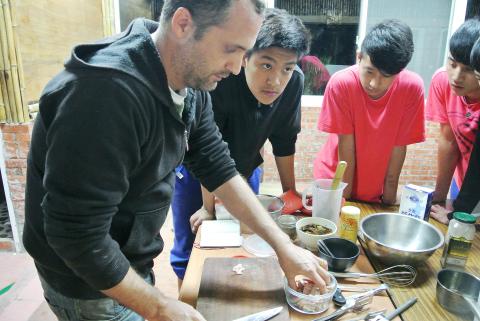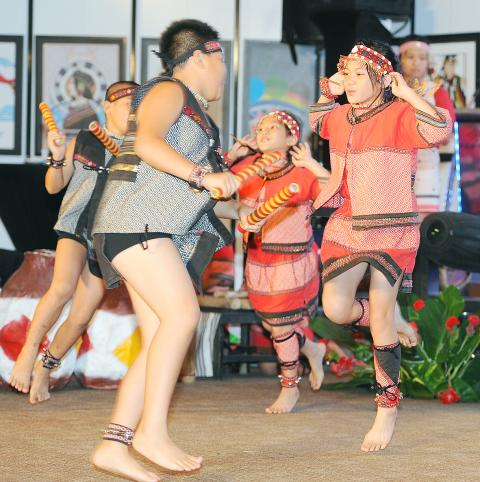French chef Guillaume Brissaud has stayed in Taiwan for eight years and married a Taiwanese woman. He sees Taiwan as his second home and runs a French restaurant in New Taipei City’s Sindian District. At the invitation of the Taiwan Fund for Children and Families, Brissaud visits Tranan Village in Wulai District every month to teach French cuisine to youngsters interested in cooking, by which he hopes that he can help disadvantaged youngsters living in remote areas to realize their dreams.
Lin Chih-yu, a social worker at the fund, said Brissaud used to be an English teacher, but last year he discussed with his wife about changing career paths by making use of the French cuisine that he had learned since childhood to open a French specialty restaurant by Sindian’s Yanzih Lake. Brissaud enjoys sharing his cuisine with others. Moreover, he has a great curiosity about Taiwan’s aboriginal culture, and he hopes that while teaching cooking skills he can obtain a deeper understanding of Aboriginal life.
The fund set up a branch in Tranan Village years ago. Tranan is in a remote mountainous area of Wulai, and three buses daily are the only way to get in and out of the village. Most adults go to Taipei to work, and some disadvantaged children have to do part-time jobs in the city to support their families. In view of this, the fund invites professionals from various fields to teach practical skills in the village, thereby giving Atayal youngsters a chance for the future.

Photo courtesy of the Taiwan Fund for Children and Families
圖由台灣兒童暨家庭扶助基金會提供
Lin said the fund will help them open a small shop for teeangers in the village where they can sell food and Atayal handicrafts. As a result, children will once again see possibilities for the future and build up their confidence to pursue their dreams.
(Liberty Times, translated by Ethan Zhan)
法國籍廚師阿勇(Guillaume Brissaud)來台八年,娶了台灣太太,把台灣當成第二個家鄉。他在新北市新店區經營法國廚房,受家扶基金會的邀請,每個月到烏來區福山部落教導對廚藝有興趣的青少年法式料理,希望幫助偏鄉弱勢青少年實現夢想。
家扶中心社工師林芷?說,阿勇原本在台灣擔任英語老師,去年和太太商量轉換職場跑道,用自己從小學到的法式料理,在新店區燕子湖旁經營法國私房菜餐廳,也樂於將自身所會的料理分享給他人。加上他對台灣原住民文化充滿好奇,希望能藉著傳授廚藝的機會,深入了解原住民的生活。

Photo: Liao Chen-huei, Taipei Times
照片:自由時報記者廖振輝
家扶中心在福山部落成立工作站多年,福山部落位於烏來深山,對外聯絡靠每天三個班次的客運,部落裡成年人多外出台北工作;有些弱勢家庭子女,還得外出打工協助家計。因此家扶中心希望邀請各領域的專業人士,來福山傳授實用技藝,開展當地泰雅族青少年的未來機會。
林芷?說,家扶將協助他們在部落裡開間屬於青少年的小店,店裡可以賣餐點、泰雅文化手工藝品,讓這群孩子重新看見未來可能性,築起他們追夢的信心。
(自由時報記者翁聿煌)

Even as he grows older, Microsoft founder Bill Gates still fondly remembers the catalytic computer code he wrote 50 years ago that opened up a new frontier in technology. Although the code that Gates printed out on a teletype machine may look crude compared to what’s powering today’s artificial intelligence platforms, it played a critical role in creating Microsoft in April 1975 — a golden anniversary that the Redmond, Washington, company celebrated on April 4. Gates, 69, set the stage for that jubilee with a blog post reminiscing on how he and his old high school friend — the late Paul Allen

Australia’s strict immigration policies have long been criticized, particularly for how they treat people with disabilities. Having been residents of Australia for years, Scottish Laura Currie and her Italian partner, Dante Vendittelli, recently experienced the impact of these immigration policies. Their son Luca, born in Australia and diagnosed with cystic fibrosis, became the reason their residency application was denied due to the anticipated high healthcare costs. Had Luca been healthy, there would have been no objections to their permanent residency. This case not only highlights discrimination against disabled individuals, but also raises questions about fairness and inclusion within Australia’s immigration

A: After holding nine concerts in Kaohsiung and Taipei recently, “God of Songs” Jacky Cheung will stage three extra shows later this week. B: They’re compensation for the three shows he postponed last year due to illness. A: He also canceled three more shows in Guangzhou last month. His health is worrisome. B: When touring Guangzhou, he dedicated his hit “She Is Far Away” to late singer Khalil Fong. That’s so touching. A: Online music platform KKBOX has also launched a campaign to pay tribute to Fong. I can’t believe he died so young: he was only 41. A:

The study had several issues. Small sample sizes made it hard to draw __7__ conclusions. Additionally, taking a __8__ like pure MSG on an empty stomach is likely to make a person ill in any case. Choosing individuals who already had a history of the symptoms could have created a bias because they were likely to __9__ the reactions again. When real scientific research on the effects of MSG was eventually done, many of the myths surrounding it were proven __10__. The U.S. Food and Drug Administration and other global organizations have found MSG safe to eat. Today, MSG